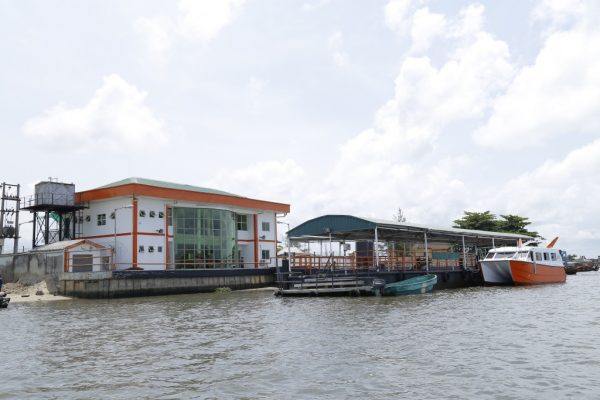Empty Container Conundrum And Rising Freight Charges
By Kenneth Jukpor & Yusuf Odejobi
Recent reports that the cost of freight from Europe to Lagos has moved from $3000 to about $13000 per 40ft container has generated lots of concern among port industry stakeholders as Nigeria grapples with tough economic times, amid the COVID-19 pandemic.
Shippers are already severely crippled by fiscal bottlenecks such as: unstable and inaccessible forex, devaluation of the naira, excessive charges and extortion at the nation’s ports.
According to shipping lines, the reason for the increase in freight charges was based on the fact that they do not have containers to move goods to Lagos as most of their empty containers are stuck in Lagos port and its environs.
While this development underscores the trade imbalance in Nigeria and logistics constraints in the country in relation to the ports, there are also arguments that several shipping lines in Nigeria keeps stockpiling empty containers at their terminals with no effective plan to return them because they are phasing out such boxes.
Globally, it is estimated that empty container conundrum costs the container shipping industry around $20 billion annually, which is approximately 40 percent of total handling costs.
However, efforts by Nigerian regulatory authorities to get shipping lines own and utilize holding bays have been futile as the companies have taken advantage of the Lagos ports access constraints to gulp colossal sums paid as deposits on containers never returned in due time.
In a bid to ensure smooth operations of the new Electronic Truck call-up system (Eto) at the ports, shipping companies were mandated to own and utilize container holding bays with capacity for 65 percent of their annual cargo traffic.
The compliance level of this Nigerian Ports Authority (NPA) directive is still difficult to ascertain because ‘Eto’ has only been in operation for a few weeks.
Historically, however, efforts by the authorities to curb the practice of abandoning empty containers by shipping companies have been futile as some maritime experts lamented that the nation has become a dump site for damaged or expired containers over the years.
Another factor responsible for this practice could be the absence of a regulatory body to inspect the standards of shipping containers brought into the country, lack of mechanism in place by shipping companies to evacuate empty containers at their terminals and the money being generated from container deposits by cargo owners.
Presently, cargo owners are expected to pay over N200,000 to shipping companies as container deposits, before they would be allowed to take their goods out of the port, but, Nigerian Shippers’ Council (NSC) has spent almost two years trying to replace container deposits with insurance.
Last month, as part of reforms that would come with the introduction of an electronic call-up system to ease truck movement in and out of ports in Lagos, NPA banned consignees from taking empty containers to any port location in Lagos, forcing shipping lines to use holding bays.
This development has enabled shippers to recoup their deposits faster when the empty boxes are taken to the shipping companies holding bays or designated logistics partners. However, MMS Plus findings revealed that some shipping companies charge truckers and freight agents when the containers are returned to holding bays.
A chieftain of the National Association of Road Transport Owners (NARTO), Alhaji Inuwa Mohammed told our correspondent that Mediterranean Shipping Company (MSC) tried to extort N150,000 from his truck via its holding bay, last week.
“Following the embargo on taking empty containers to the port, I have successfully returned most of the empty containers to the designated holding bays of shipping companies, but I had an incident with MSC yesterday as they asked my truck to pay N150,000 before dropping a container at the facility they asked us to patronize. Why should I pay money to return MSC’s property to its holding bay at Ijora? Am I the owner of the container? I have decided to keep that container until they are willing to collect it. However, this is hindering that truck from taking up another business,” Inuwa lamented.
Speaking further on the alleged scarcity of containers overseas, he said, “These foreign companies are just trying to charge more. There is a debate between shipping companies who claim their containers are trapped and other stakeholders who say the containers are mostly expired and accuse the shipping lines of converting Nigeria to a dumping ground. This debate is interesting and I expect NPA and Shippers’ Council to step in. The regulators can negotiate waivers for shipping lines to bring in sweeper vessels to move their empties away”
According to him, shipping companies contributed to the high cost as well as demise of Lagos ports system.
Meanwhile, the President of Shippers Association Lagos State (SALS), Reverend Jonathan Nicol told our correspondent that the issue of empty containers should have been of benefit to Nigeria if the nation had a well-structured system for exports.
His words: “Ideally, this issue of empty containers should have been of benefit to Nigeria if we have the cooperation of all those involved in the management of our ports. This is because export has suddenly blossomed and we need these empty containers to carry exports from the farms to the shipping lines and then out to whichever country they are destined to.”
“It is of great concern for Nigerian shippers to go through another increase of freight charges. This is more disheartening because we have told the government to do address the empty container conundrum. These empty containers are littered around Lagos even to outside the state. You see empty containers on the highways, abandoned on streets, and other places, but this wasn’t the practice in the past.”
Noting that several years ago, shipping lines went after their empty containers, sending officers to track down the containers, he regretted that such era had become history because of policy summersault in the port sector.
“It’s a two way thing. In the absence of export, there are other empty containers lying in terminals which aren’t in use and should have been evacuated from the ports by shipping lines. If they have space for full containers, how come they don’t have space for empty containers? Is it because the federal government is not charging them for storage? If they’re charging shippers for not bringing their empty containers to the port and shippers have to pay up to N200,000 without any refund because of traffic, why should they put empty containers at the terminal without evacuating them? The reason is not farfetched, some of those containers may have expired and they cannot export them back to their country of origin. They are probably in a dilemma which forces them to keep the empty containers here, unfortunately, Nigeria doesn’t have a regulatory body to ask them questions,” he added.
A former President of National Association of Government Approved Freight Forwarders (NAGAFF) Chief Eugene Nweke, itemized Nigeria’s tax regime as a factor encouraging shipping lines to dump empty containers at terminals, compared to foreign nations who tax every container within the port axis.
He lamented that a lot of things have gone wrong within the Nigerian port system, narrating that NPA had the mandate to ensure every ship evacuates empty containers immediately they offload their vessels.
“We told the NPA to go back to their Act to enforce every ship to evacuate empty containers immediately they offload. If a ship brings 5000 twenty equivalent unit (TEUs) from China, as long as it discharges 5000 TEUs, it should move out 5000 empty containers immediately. Ships shouldn’t bring containers, dump them and sail back empty. They have turned the terminals to a public sight for empty containers waiting shipments thereby denying the port interaction as it ought to be,” Nweke queried.
He also explained that most of the companies producing containers have either suffered financial setbacks or acquired by shipping lines.
“The practice before was that containers were always on lease to the shipping lines, the shippers or shipping lines didn’t own the containers in the past. The containers were produced and leased on agreement to the shipping lines, but they brand it with their names. But that system has changed because most of the shipping lines are now acquiring the containers,” he posited.
On his part, the Director General of Lagos Chamber of Commerce and Industry (LCCI), Dr. Muda Yusuf stated that the increase in freight charges will naturally have an immediate impact on the economy, noting that China is Nigeria’s top import country.








